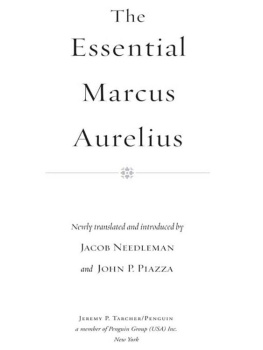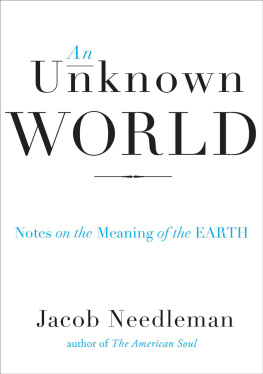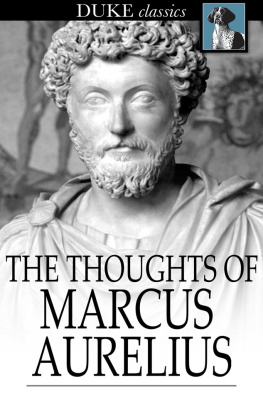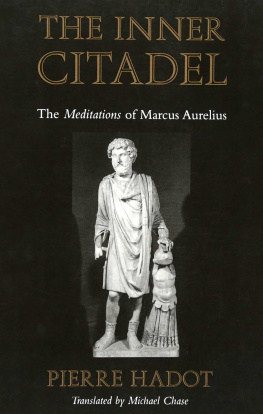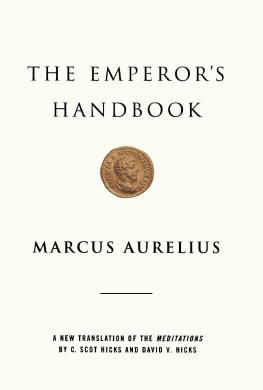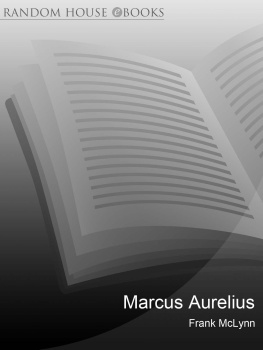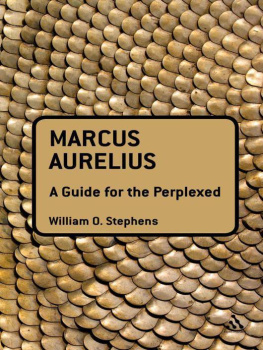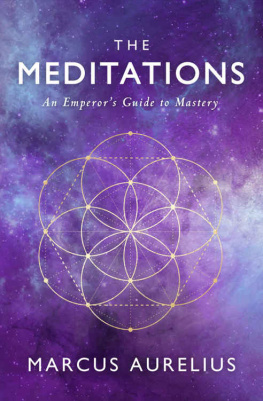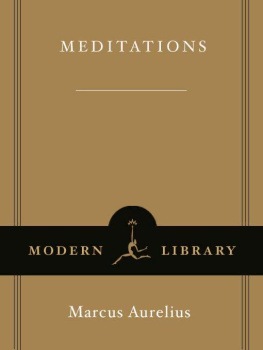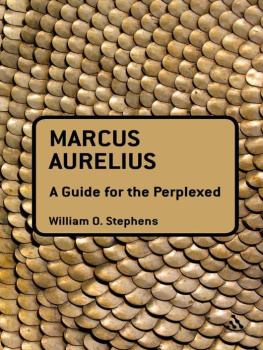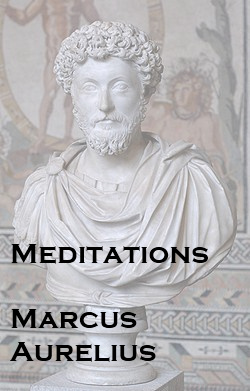1. Only one of Marcus five children lived long enough to succeed him.
10. The reference is to Homers Odyssey , 4.690. Penelope, wife of Odysseus, is telling her suitors about her husband, Odysseus, who has been gone for many years and is thought dead.
11. Hesiod, Works and Days, lines 197 and following, describes the fate of the fallen race of men, where the last of the gods will go from the wide-pathed earth and forsake mankind to join the company of the deathless gods: and bitter sorrows will be left for mortal men, and there will be no help against evil.
12. This is one ancient theory of the nature of the soul. See Heraclitus fr. 12 and Aristotle De Anima 405 a 25.
13. The Greek word for rightly, hod , is derived from the word hodos , meaning road or path.
14. A common tragic lament.
15. Homer, Iliad, 7.97100. Menelaus berates his companions when no one displays the courage to fight Hector, an almost certain death.
16. The bog has been understood to represent our normal state of existence, as opposed to the clarity and purity of the starry sky.
17. The Greeks and Romans typically depicted the Fates as spinning time and destiny on a yarn wheel.
18. According to many branches of ancient philosophy, the planets, stars, and heavenly bodies are considered to be gods and divine, as much as the personified deities.
19. Marcus reminds himself of a passage in Platos Theaetetus (174 de), during a discussion in which the benefits of land ownership are contrasted with the life of the philosopher, who, by owning nothing, in fact owns the entire world.
2. Marcus is applying Epictetus interpretation to a famous saying of Socrates. For just as Socrates used to say that the unexamined life is not worth living, in this way we should never simply accept an impression that we have not scrutinized, but say to it: Just a minute; let me see what you are and where you come from. Epictetus, Discourses, 3.12.15.
20. In Marcus time, the epic poetry of Homer and Virgil comprised not only a literary but also a philosophical and religious education. This passage, and the quotes that follow, paraphrase Homers Iliad , 6.1469.
21. Marcus here points out the separate but related meanings of the Greek word organon , tool, which we retain in English as organ.
22. Sophocles, Oedipus Rex, 1391. Oedipus, upon discovering his tragic fate, laments that Cithaeron, the sacred mountain upon which he was abandoned as an infant, allowed him to live.
3. I.e., those which have been mentioned above.
4. Agathon (born circa 450 B.C. ) is the celebrated tragic playwright, as well as political figure, who is portrayed in the comedies of Aristophanes and the dialogues of Plato, in particular the Symposium .
5. The contrast here is between a particular citys divinity, Cecrops, the mythical founder of Athens, and Zeus, who is the god of all humankind. This is in keeping with the Stoic notion of a world-state, which unites rather than divides people.
6. The Greek word for abscess literally means stands apart.
7. Helice was destroyed by an earthquake and tsunami in A.D. 373 (Pausanias 9.30). Pompeii and Herculaneum were destroyed by the eruption of Mount Vesuvius in A.D. 79.
8. The Greek word is megalopsuch , from which English gets the Latinized word magnanimous.
9. The Greek deity of medicine, who was the mythical first physician.
The Essential Marcus Aurelius
T HE T ARCHER C ORNERSTONE E DITIONS
Tao Te Ching
by Lao Tzu, translated by Jonathan Star
The Essential Marcus Aurelius
newly translated and introduced
by Jacob Needleman and John P. Piazza
Accept This Gift: Selections from A Course in Miracles
edited by Frances Vaughan, Ph.D., and Roger Walsh, M.D., Ph.D.
foreword by Marianne Williamson
The Kybalion
by Three Initiates
The Spiritual Emerson
essays by Ralph Waldo Emerson,
introduction by Jacob Needleman
The Essential Marcus Aurelius

Newly translated and introduced by
J ACOB N EEDLEMAN
and J OHN P. P IAZZA
J EREMY P. T ARCHER /P ENGUIN
a member of Penguin Group (USA) Inc.
New York
JEREMY P. TARCHER/PENGUIN
Published by the Penguin Group
Penguin Group (USA) Inc., 375 Hudson Street, New York, New York 10014, USA Penguin Group (Canada), 90 Eglinton Avenue East, Suite 700, Toronto, Ontario M4P 2Y3, Canada (a division of Pearson Penguin Canada Inc.) Penguin Books Ltd, 80 Strand, London WC2R 0RL, England Penguin Ireland, 25 St Stephens Green, Dublin 2, Ireland (a division of Penguin Books Ltd) Penguin Group (Australia), 250 Camberwell Road, Camberwell, Victoria 3124, Australia (a division of Pearson Australia Group Pty Ltd) Penguin Books India Pvt Ltd, 11 Community Centre, Panchsheel Park, New Delhi110 017, India Penguin Group (NZ), 67 Apollo Drive, Rosedale, North Shore 0632, New Zealand (a division of Pearson New Zealand Ltd) Penguin Books (South Africa)(Pty) Ltd, 24 Sturdee Avenue, Rosebank, Johannesburg 2196, South Africa
Penguin Books Ltd, Registered Offices: 80 Strand, London WC2R 0RL, England
Copyright 2008 by Jacob Needleman and John P. Piazza
All rights reserved. No part of this book may be reproduced, scanned, or distributed in any printed or electronic form without permission. Please do not participate in or encourage piracy of copyrighted materials in violation of the authors rights.
Published simultaneously in Canada
Most Tarcher/Penguin books are available at special quantity discounts for bulk purchase for sales promotions, premiums, fund-raising, and educational needs. Special books or book excerpts also can be created to fit specific needs. For details, write Penguin Group (USA) Inc. Special Markets, 375 Hudson Street, New York, NY 10014.
ISBN: 978-1-1012-1611-8
While the authors have made every effort to provide accurate telephone numbers and Internet addresses at the time of publication, neither the publisher nor the authors assume any responsibility for errors, or for changes that occur after publication. Further, the publisher does not have any control over and does not assume any responsibility for author or third-party websites or their content.
Introduction
J ACOB N EEDLEMAN
What could be clearer? No other life is more appropriate for the practice of philosophy than that which you now happen to be living.
M EDITATIONS, 11.7
W hat is the secret of this remarkable book? What has enabled it now and in the past to speak to countless men and women throughout the world without evoking anything but quiet respect and gratitude? We know that the works of the great philosophersfrom Plato and Aristotle to the modern giants Nietzsche, Heidegger, and Wittgensteinall have their passionate, sometimes angry, defenders and detractors. Not so this profoundly influential book. Although there are scholarly disagreements about the meaning of certain passages, hardly a trace of agitation or feverish controversy has ever found its way into the atmosphere of this text. Why is that? What enables these private, intimate meditations of the emperor of Rome to transcend the noise of his (and our) embattled world? What enables his words to reach so gently across the millennia, offering us the hope and the taste of an inner strength that only a quiet mind can bring?
Simply to summarize the main ideas in the book can give no sense of the power it has to help people face the vicissitudes that are the lot of every human lifethe shocks, the terrors, the disappointments, the sorrows, as well as the overmastering triumphs and cravings that sweep us away; the betrayals that wound and confound us; and the specter of death that shadows every moment of the days and years that are given us to live on earth. Yes, the book offers us the great idea of the Mind of the universe calling to us from within our own mind. And, yes, it speaks of the inner freedom that we experience when we step back in ourselves and try to listen to that call. The cultivation of this inner freedom, says Marcus, is both our deepest human possibility and the real root of the self-respect and moral power for which we yearnthe ability to love and act justly in the conduct of our lives.

